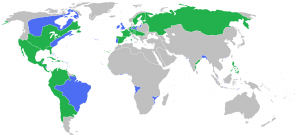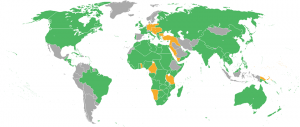
by Bryan Caswell and Kevin Lavery
BC: What if I told you that what we know as the First and Second World Wars should really be known as the Second and Third, or even the Third and Fourth? Our habit of only identifying the conflicts that took place from 1914-18 and 1939-45 as ‘world wars’ betrays a modern arrogance, that somehow the world only reached the capacity for global conflicts recently, within the last century. My own work with imperial history has indicated that this is far from the truth; globalization deserves to be projected back well beyond the twentieth century, and if we are to define a world war as any war in which fighting takes place across most of the world (or maybe, more reasonably, a majority of the inhabited continents), then numerous conflicts fit the bill. Indeed, the first known usage of the phrase ‘world war’ in the English language surfaced in a Scottish newspaper, the People’s Journal, in 1848: “A war among the great powers is now necessarily a world-war.” In other words, once the powers of Europe had extended outside of Europe and around the globe, a European war would necessarily ignite a worldwide conflict. Two such wars deserve special attention, and are perhaps the most deserving of being reclassified as world wars: the Seven Years War, which saw Britain and France wrestle for control of the Americas and India with fighting spread across five continents, and the Wars of the French Revolution, which set the world aflame for twenty-six years.

KL: It’s true that colonial competition between European powers created the conditions for military conflicts to play out across the globe long before the twentieth century. In that sense, you could certainly contend that the term ‘world war’ should be used more expansively. The problem is that these early world wars were largely European conflicts that metastasized beyond the continent. By insisting that a world war refers only to its geographic spread, you leave unchallenged the term’s Eurocentric connotations. Rather than thinking of these pre-1914 conflicts as true world wars, it may be better to treat them as European imperial wars fought on a global scale (of course, some might argue that this is true in a sense for the First World War as well).

BC: Trying to correct Eurocentrism is always a laudable goal, but in doing so we also should take care not to ignore examples of non-European agency before the grand narratives of decolonization in the twentieth century. The First and Second World Wars are known as such not only because fighting took place around the world, but also because peoples from around the world fought in them. The great conflicts of the eighteenth century were no different, and indeed might have even involved more agency for non-European peoples than the First World War, when the resources and manpower of the British and French Empires were mobilized in service of their parent metropoles. The Seven Years’ War, in particular, saw Native American nations attempt to play off opposing empires for their own gain, while Britain’s foothold in India was ultimately strengthened through involvement in Mughal court politics that came at the invitation of Indian nobles in Bengal, not to mention the numbers of native Indian soldiers serving in the armies of the East India Company on the subcontinent.
KL: Of course. By no means should the contributions of native and colonized peoples be ignored during these early global conflicts, but the concept of a world war takes on a new dimension in the twentieth century with the widespread participation of non-European states like Japan and China. The Native American experience in the Seven Years War was hardly irrelevant to the conflict, especially from their perspective, but it was not central to considerations of grand strategy and world ordering on the level of the Japanese invasion of German colonies in China during the First World War. On a related note, I think we should distinguish between how these “sideshows” related to the ‘world war’ to which they were connected. Both the Sino-Japanese War and the War of 1812 represented less central parts of their respective conflicts, at least from the European perspective, but the former was more closely linked to the broader course of the Second World War than the latter was for the Napoleonic Wars. In other words, we can speak of the Sino-Japanese War as an integral part of World War II, but we have to think of the War of 1812 as one of many interrelated conflicts fought during the Napoleonic Wars.

BC: An excellent point, and perhaps this is where my original scenario begins to break down. In the century between Napoleon’s defeat at Waterloo and the assassination of Franz Ferdinand in Sarajevo, great strides in technological innovation took place that knitted nations and the entire world closer together. While the Seven Years War, Wars of the French Revolution, and indeed all the other smaller European imperial wars that preceded them did see some level of unified strategy, at least on the part of Britain, there was not yet any conception of a unified, professional, merit-based command structure that could coordinate a single war effort across multiple conflicts. Maybe this, then, is the essence of a world war: not geography, nor participation, but connection. Certainly no one will argue that the twentieth, not to mention the twenty-first, century knitted our world together tighter than it ever had been before, but the connections that existed beforehand should not be overlooked, no matter how loose or slow they were. Perhaps these earlier wars should not be considered full world wars, but neither should they be discarded; instead, we might consider them a series of conflict Venn diagrams, overlapping and influencing each other. The globalization begun by the European empires should not be underestimated by our modern sensibilities, and it is long past time to give it its due.
